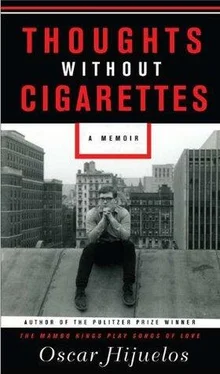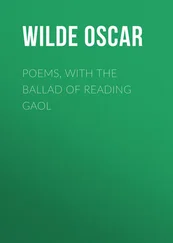And yet that was not enough for some folks who almost seemed angry that the face and personality behind the conception wasn’t what they wanted it to be. I knew them by the way they’d stare at me during my readings, or when they didn’t laugh at my jokes, and ultimately, more often than not, I could tell just which ones were bound to get up and leave in the middle of my reading.
Sometimes, at midnight, in a hotel room in Portland or Minneapolis or St. Louis — could be anywhere — I’d lie down on the bed, feeling fairly exhausted, and man, the first thing I’d wish I could be doing (besides smoking a cigarette) didn’t necessarily have anything to do with women (even though at every venue, there seemed to be someone interested in getting to know me) nor with the prospect of making some money (which was what my agent always talked about) but with the small ways I had of making myself happy — as when I’d sit down with a really good guitarist, like my old pal Nick or the best jazz player I knew, a fellow named John Tucker, whom I met years before on the steps of Columbia University’s Low Library, to jam for a few hours, leisurely and without a worry in the world, a glass of wine or two by our side, a cigarette burning in an ashtray — just like it happened sometimes in my novel, to my characters Cesar and Nestor Castillo.
That same autumn, once I’d come back from the tour, I started teaching creative writing at Hofstra University in Long Island at night, a job I had gotten through a writer friend, Julia Marcus, before the book came out, as a hedge against going broke. It required an hour-and-a-half commute each way (subway, train, bus), a real pain, but at least it got my mind off the hoopla and that constant feeling that something both wonderful and awful was happening to me. Though I had enjoyed meeting the majority of my readers, it didn’t take much of a curious expression, on the part of both Latinos and non-Latinos, to make me feel that, once again, I had become the receptacle into which people’s prejudices poured: Altogether it made me feel like some kind of lab specimen. Aside from escaping that scrutiny, however, I discovered that I simply enjoyed being around those Hofstra kids, most coming from what I would call a nouveau middle-class background — and, who, in most cases, seemed to be the first in their second- or third-generation post-immigrant families to make it to college. One of my classes started at eight, the other let out around six, as I recall. Coming home one evening, I found the very patient and affable writer Richard Price waiting outside my apartment on a stairwell. He had called me up out of the blue, having found my number in the telephone book, but I was so distracted in those days that the time of our meeting had completely slipped my mind. No matter — we ended up having a bite to eat, whereupon he asked me if I would ever be interested in writing scripts for Paramount, with whom he had some kind of arrangement as a scout: I was dense and provincial-minded enough to politely decline, though we remained friends thereafter.
In general, that whole period threw me. I met all kinds of people. George Plimpton invited me over to one of his famous Paris Review parties, where I found myself rubbing shoulders with Norman Mailer, Kurt Vonnegut, and Gay Talese, among other authors of note. That same night, I had dinner with the writer Peter Maas and Mr. Plimpton — George, as he asked me to call him, offering to conduct an interview with me for his literary journal. Though I told him I would have to think it over, I had already made up my mind to avoid it, my own stupid modesty (infernal can’t really succeed too much reticence) getting in the way. But I also believed that it was something that should come later in one’s career: After all, what had I written at that point but only two books? (Later, he would publish an interview with me in Newsweek magazine entitled “The Reluctant Mambo King.”)
Around that time a well-known Latin musician, of the old New York school, invited me over to his place on the West Side, where he did his best to get me high on coke — think he saw it as a perverse test of character. I declined that as well. Later, though I had long before interviewed the great Afro-Cuban composer Chico O’Farrill for my novel, I became a regular at his parties, where my local success was greeted warmly by some, skeptically by others. (I met musicians like Johnny Pacheco, Paquito D’Rivera, Mario Bauzá, Graciela, and of all people, Desi Arnaz’s pianist and arranger, Marco Rizo, a truly sweet man.) Of those, Mario was my closest neighbor, literally living around the corner from me on 105th and Amsterdam: I’d go jogging in the mornings and find him sitting around on some milk crates with friends in front of a corner bodega Havana-style — he’d laugh at the sight of me, Mr. Slightly Chubby Four-Eyes, jogging by, his head shaking like Ray Charles’s, the man rapping his knees. Inviting me up to his apartment a few times, he wanted me to write a book about his life story — I proposed that we do it with a tape recorder, and it made him really happy, but it became one of those things that I kept putting off and off, as my career got busier, until Mario, coming down with a cancer that racked his entire body, died a few years later.
While teaching my classes at Hofstra, I attended numerous literary fetes where I first befriended Paul Auster and Francine Prose, and many other writers as well — I won’t bore you with such a list — but, after a while, as much as I enjoyed such an opportunity, I became somewhat befuddled by the fact that for as many events and literary gatherings as I attended, I rarely encountered another homegrown Latino author. A strange tale, however, about another “me.” I had gone to a party and, introducing myself to several people, received a frosty reception. A slightly tipsy young woman told me, “You can’t be him. I met him last night. He is dark haired and swarthy and nothing like you.” Apparently, I soon learned, there was someone going around town impersonating me: Later, when someone from FSG turned up and explained that I was indeed Oscar Hijuelos, several of those folks came up to me to apologize; a few days later, I even received a note from the same woman, profusely begging my pardon. I wrote her back a one-word reply: “Uh-huh.” And while I much appreciated my access to that world, and being that rare creature, a Latino writer suddenly in the spotlight, I felt put off by the fact that I seemed, for the most part, to be “it,” as if I had become a temporary member of an exclusive club that, unless you had connections, was nearly impossible to get into.

Part of me wanted to step away; the other, my public persona, had no choice about the matter, especially after my novel had been nominated for both the National Book Critics Circle and National Book awards. Part of the process, involving the latter, entailed a public reading at the National Arts Club. My fellow nominees included Amy Tan ( The Joy Luck Club ), Katherine Dunn ( Geek Love ), and John Casey ( Spartina ). Introductions made, each of the authors read from their books, though as I listened I felt somewhat annoyed by the general propriety of the selections, and while I had originally selected a section in which the Castillo brothers meet Desi Arnaz and his wife at the club Tropicana, in the spirit of livening things up, I made a last-moment change, choosing instead to quote from a monologue in Cesar’s voice about all the women he’d deflowered in Cuba back in the 1940s, and — who knows what I was thinking — while Mr. Casey, I recall, read a description of a man whitewashing the hull of his boat in his backyard, I lingered on a passage wherein Cesar Castillo, in quite wonderful language, I thought, describes his methods for preserving a woman’s virginity while entering another of her, uh, most intimate places (which, by the way, I first conceived in Italy, where they are obsessed with anal sex). I should have known better, but then I am fairly certain that winning the award was one of the last things on my mind. Needless to say, I think I shocked most of that rather conservative audience, which seemed to consist to a large extent of genteel white-haired New York society ladies, and in the end, my book did not receive the award — the genteel John Casey with his whitewashed hull and prose did.
Читать дальше













